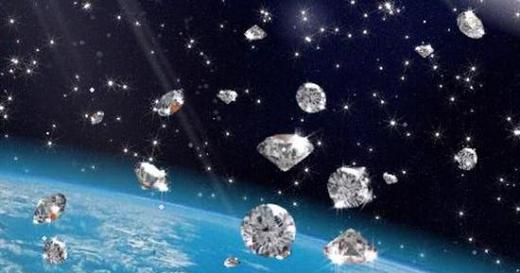
What if we were all rich? What if we already are?
Itís not raining money, but it might be raining diamonds.
Not here on earth, of course. For that youíll have to go to the planet Neptune. At least, thatís what scientists are now telling us.
I wonít pretend to understand the phenomenon of spontaneous diamond showers deep inside the ice giant that lurks at the outer reaches of our solar system. Nor will I attempt to explain how scientists here on earth are simulating the process.
Instead, letís talk about the practical applications of mass diamond production.
Itís long been known that the diamond industry artificially inflates prices through market manipulation and manipulative advertising. Diamonds may be forever, but so are Cubic Zirconia -- and most people canít tell the difference. So why spend $5000 on a two karat diamond when you can buy a comparable CZ for 30 bucks?
To paraphrase Will Rogers, people will eagerly spend money they donít have on things they donít need to impress people they donít like. The adage has been repeated by many, including Lev Leviev, the world renowned ďKing of Diamonds.Ē
Because of their hardness and heat conduction, diamonds do have genuine value: in the manufacture of cutting and drilling equipment, as well as for research and technology. But as far as jewelry, the cost is all about hype.
Which should make us pause to wonder: what if it really did start raining diamonds?
A famous parable tells the story of a poor man who travels to a far away island where the ground is littered with diamonds and precious stones. The moment he gets off his ship, he falls to the ground and begins stuffing his pockets with gems.
The people around begin to laugh. ďWhy are you picking up worthless pebbles?Ē they ask. In an instant, the man realizes that the stones, worth a fortune in his own country, have no value at all here. And since the obscure island is only visited by ship once a year, he will have to find a way to support himself until the next ship comes to carry him home.
After making some inquiries, the man learns that the most profitable source of income on the island is cooking-fat. He discovers that he has a particular talent in this area, and before long he is making an excellent living in the cooking-fat industry.
The year passes quickly, and when the ship finally arrives the man packs up all his valuable fats to bring home with him. He reaches the port just as the ship is getting ready to make sail. All at once he remembers the reason why he came in the first place. He hurriedly bends down to scoop up a few stones, then has no choice but to board the ship before it departs.
Upon returning home, the manís family rejoices at the fortune with which he has returned. But the man is forlorn. ďYou donít understand,Ē he says sadly. ďIf I hadnít forgotten why I was there, we might have a thousand times what I brought back.Ē
If we bother to think about it, itís be obvious that shiny stones are not the source of happiness. Objects have value because they are useful, because they are beautiful, or because they are rare. But when we allow others to convince us to make them rich by investing in things with no intrinsic value, is there anything more foolish?
King Solomon says: There is one who thinks himself rich and has nothing; there is one who thinks himself poor and has great wealth.
The blessing of family, of friends, of community; the joy of kind acts and charity; the inspiration that accompanies wisdom -- these are the gems that are truly priceless. They cost far less than shiny stones, and they make our lives infinitely richer.
As long as we donít forget.
Rabbi Yonason Goldson is a professional speaker and trainer.† Drawing upon his experiences as a hitchhiker, circumnavigator, newspaper columnist, high school teacher, and talmudic scholar, he teaches practical strategies for enhancing communication, ethical conduct, and personal achievement. He is the author of Proverbial Beauty: Secrets for Success and Happiness from the Wisdom of the Ages is available on Amazon.


 Contact The Editor
Contact The Editor
 Articles By This Author
Articles By This Author